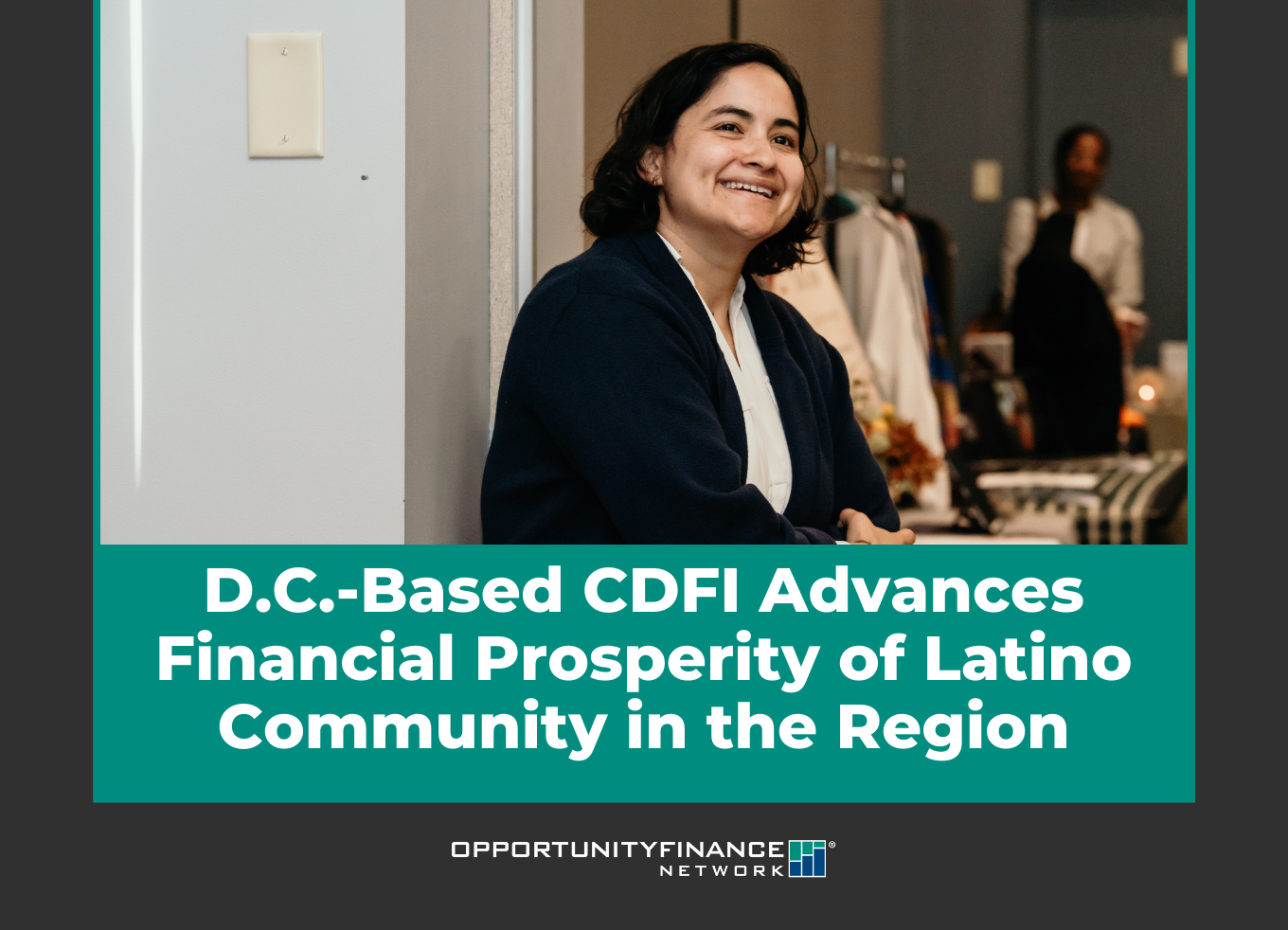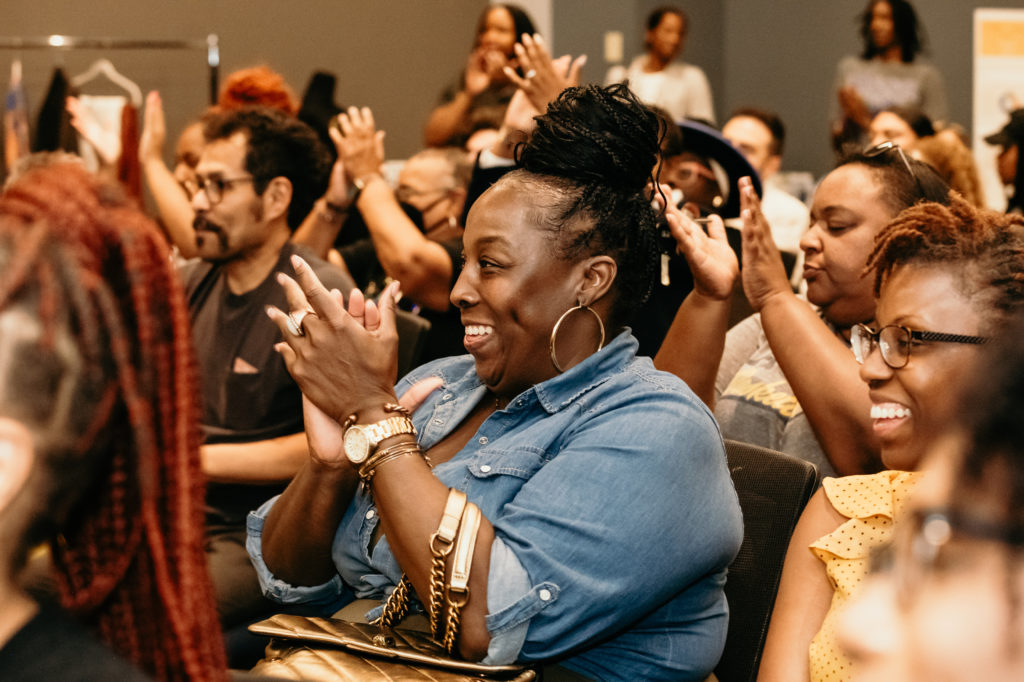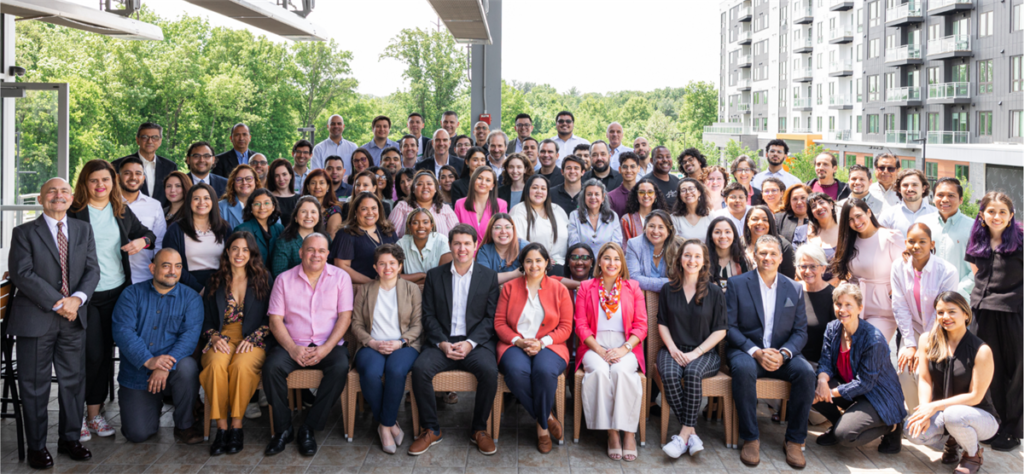
D.C.-Based CDFI Advances Financial Prosperity of Latino Community in the Region
Read time: 7 minutes
Latino Economic Development Center reflects on more than 30 years driving the economic and social advancement of Latinos in the nation’s capital.
In celebration of National Hispanic Heritage Month, we’re highlighting the work of OFN member Latino Economic Development Center (LEDC).
Headquartered in Washington, D.C., with deep roots in the Mt. Pleasant and Columbia Heights neighborhoods, LEDC began financing justice in their community in 1991. LEDC now serves clients across D.C., Maryland, Virginia, and Puerto Rico.
With a vibrant staff of 86, their mission is to drive the economic and social advancement of low- to moderate-income Latinos and other underserved communities by equipping them with the skills and tools to achieve financial independence and become leaders in their communities.
We recently connected with CEO Emi Reyes, to learn more about LEDC’s work.
How do you describe LEDC to members of the community you serve?
LEDC is fundamentally dedicated to advancing the financial prosperity of our community members. When describing our CDFI to the community, I’d emphasize our commitment to enhancing their financial well-being through a range of wraparound services.
These services are designed to address various financial needs within our community. We understand that true empowerment extends beyond monetary success, encompassing the ability to take charge of one’s own destiny and contribute positively to the community.
Through targeted programs and initiatives, we equip our members with the necessary tools to achieve their goals. This could involve financial education, access to affordable lending options, entrepreneurship support, and leadership development. By providing these resources, we not only help individuals realize their potential but also foster a sense of ownership and pride within the communities we serve.
We recognize that each community has unique needs, and we tailor our approach to address these specific challenges. We’ve cultivated strong partnerships with local organizations and national institutions. These collaborations allow us to leverage collective expertise and resources, ultimately creating a bigger positive influence within the community.
We’ve also taken measures to ensure that our services are accessible to all community members, irrespective of their socio-economic background. LEDC offers educational workshops and resources to enhance financial literacy, empowering individuals to make informed decisions.
What’s your “why” for working in the CDFI industry, and how did you end up at LEDC?
My motivation for working in the community development financial institution (CDFI) industry is deeply rooted in my personal connection to the neighborhood and my passion to ensure that local residents are not left behind amidst the waves of improvement and development in the community.
Growing up in D.C., I have witnessed first-hand the transformations it has gone through. As new businesses moved in and infrastructure improved, there is an undeniable sense of progress and growth. However, I have also noticed that this progress has not been equally accessible to everyone. Many long-time residents, who have played a crucial role in building the community’s identity, are struggling to keep up with rising costs of living and limited economic opportunities. The disparity between the advancements the neighborhood is experiencing, and the struggles faced by its long-term residents help drive my work.
I believe that true community development goes beyond bricks and mortar; it’s about creating an environment where everyone can thrive. CDFIs play a critical role in addressing these gaps by providing accessible financial resources and services to underserved populations and empowering them to participate in the positive changes happening around them.
By working in the CDFI industry, I can channel my passion for equitable community development into tangible actions. I collaborate with local entrepreneurs, community leaders, and residents to identify needs, offer financial assistance, and provide education on financial management. This work not only allows me to support individual success stories but also contributes to the overall resilience and vitality of the community.
In the past year, what project do you feel had the biggest impact on the community you serve?
In the past year, LEDC has been fortunate enough to further explore cohort models for our technical assistance programs. This approach has opened up new avenues for enhancing the impact of our services and fostering a collaborative learning environment among participants.
Two great examples are our Food Venture Initiative and Wealthy Woman programs. These are two cohort-based programs that target entrepreneurs looking to make that next big step. A lot of cohort members are people who are starting their ventures, but we also see many folks who have been entrepreneurs for years, sometimes decades, and are really looking to hone their craft and operation.
One of the key benefits of the cohort model is the sense of community it creates among members and with similar goals and challenges. By bringing together a group of participants who are all working towards common objectives, we have found that peer-to-peer support and knowledge sharing naturally emerge. This collaborative atmosphere not only accelerates the learning process but also builds a network of like-minded individuals who can continue to lean on each other even after the program concludes.


We recently celebrated the 2023 graduating classes for both the FVI and WW programs and they were two instances where it makes you realize how many individuals you are impacting. The graduation ceremonies were more than just a formality; they were powerful reminders of the profound effect our programs have on the lives of individuals and the broader community. Witnessing the graduates laugh, cry, and celebrate their achievement served as a testament to the lives we are impacting.
What’s the biggest opportunity to create greater impact that LEDC is considering?
With over 30 years of experience, LEDC has embraced the critical concept that in order to truly create meaningful impact, measuring that impact becomes paramount. While we’ve encountered challenges in grasping the long-lasting effects of our work, we’re actively addressing this with capacity building. We are committing both financial resources and time to equip our staff with enhanced skills and bolster our data infrastructure.
Our strategy is geared towards establishing a more comprehensive framework that enables efficient data collection, analysis of metrics, and the seamless operationalization of our data. We acknowledge that turning this ambitious vision into reality requires substantial investment. For the first time, LEDC is developing an individual giving strategy launching within the next fiscal year. The aim is to secure the necessary financial backing that will be instrumental in propelling our mission-driven objectives forward.
LEDC is ready to not only design and hone its existing programs but also to understand the impact of our work. This transformation will place us in a position to enhance our own efficacy and to stand as an example of how a commitment to data-driven strategies can authentically amplify our mark in the community.
If you could summarize the CDFI industry in one word, what would it be?
If I had to summarize the CDFI industry in just one word, I’d say “inclusive.” The essence of our work lies in its commitment to inclusivity and equitable economic development. Our organizations strive to empower individuals and businesses that might otherwise be overlooked or denied traditional financial support.

By providing targeted financial products, technical assistance, and community development initiatives, CDFIs help create opportunities and pathways to prosperity for those who have historically been excluded from mainstream financial systems.
CDFIs embody a collective effort to foster financial inclusion and ensure that all members of society can partake in economic progress by actively engaging with the communities we serve and tailoring to their unique needs and aspirations.
Stay in the loop with LEDC by signing up for their newsletter. And, if you’re attending the OFN Conference in October, experience LEDC’s impact on first-hand — Mt. Pleasant and Columbia Heights are just a short walk from the conference hotel!
Are you a CDFI interested in joining OFN’s membership? Learn more about the benefits of joining our network of 400 members and apply today!
Attend OFN Events
Visit our events page to learn more about upcoming and past events.
Find Other CDFIs
Interested in learning more about other CDFIs in your region? Visit OFN’s CDFI Locator.
Stay Connected with OFN
Subscribe to OFN newsletters to receive regular updates straight to your inbox and check out the OFN blog for the latest coverage from OFN and the CDFI industry.
Follow us on Twitter, Facebook, Instagram, and LinkedIn.
Related Articles
